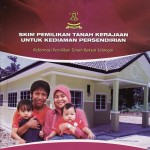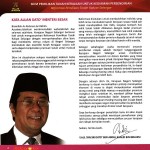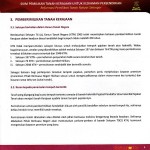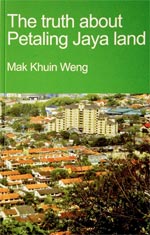
IN June 2011, the Selangor government promised Petaling Jaya Old Town house owners they could renew their 99-year leasehold land titles for a mere RM1,000. On 5 July 2012, at a public dialogue at the PJ Civic Centre, Selangor Menteri Besar Tan Sri Khalid Ibrahim reaffirmed this commitment and said applicants need not wait longer than three months.
What has become of this promise? And more importantly, is the renewal of leasehold land titles legal?
Runaround
For some applicants, it’s been a year, and their applications are still pending.
Petaling Jaya Section 2 resident Alwin Lim said he was charged RM2,042 instead of RM1,000 to renew his leasehold title. An additional RM542 was added on for administrative costs, and then a further RM500 for a burial site, whether or not the applicant uses the state’s cemetery land eventually.
He’s also been given the runaround when following up on his application, made more than six months ago. “I have asked what happened to my application and I have been passed from one department to the next, from the Sungai Buloh Land Office to the Shah Alam Land Office and back again,” Lim relayed to me recently.
Illegal renewal?
But the delay in renewing the leases could be the least of property owners’ worries. When we take a close look at renewal of leasehold titles, it appears that there are actually no legal provisions for such an exercise.
As a starting point, let us look at the official booklet on the leasehold renewal programme published by the Selangor Menteri Besar’s office. In his opening address, Khalid said the following in the third paragraph:
Reformasi dilakukan untuk membolehkan individu yang telah lama menduduki tanah kerajaan secara tidak sah boleh mendapatkan hak milik, lanjutan tempoh hak milik tanah boleh dilakukan dengan kadar premium yang mampu dijelaskan, memutihkan hak milik individu yang telah melanggar syarat kegunaan tanah… (emphasis mine)
So the premise is that residents who have been squatting on government land illegally can now legalise their residency. How will this happen? Here’s what the booklet says about the remedy:
KTN (Kanun Tanah Negara) tidak memperuntukkan seksyen khusus untuk melanjutkan tempoh pajakan tanah atas hakmilik. Walau bagaimana pun, amalan yang dipraktikan adalah melalui Seksyen 197 dan Seksyen 76 KTN yang mana permohonan tersebut dilakukan secara serentak dan 204B KTN. (emphasis mine)
First, there is an admission that there is no provision to renew land leases. Nonetheless, the state government cites three provisions of the National Land Code (NLC) used to process the application anyway, because that’s how it’s been done — Sections 197, 76 and 204B. Let’s take a look specifically at what these sections say:
- Section 76 states that a state government can alienate out state land for a lease of 99 years or alienate it in perpetuity (freehold).
- Section 197 states that land can be willingly surrendered to the government by title holders.
- Section 204B deals with situations where a landowner surrenders a plot of land to enable it to be divided into two or more parcels. The state government then returns the subdivided parcels to the landowner.
None of these three provisions mention anything about leasehold renewal. So, it appears that what the Selangor government is doing is illegal.



Lacuna
What’s been happening in the application process is this — owners fill up Form 12A which mentions section 197. This means they are surrendering their land willingly to the government. This makes their land “state land” again, enabling the state to re-alienate the land under section 76, if it so chooses. The government then returns the land title to the owner with a further 99 year lease.
But when the owners surrender their titles with their application forms, and effectively surrender their lands voluntarily to the government, there’s nothing on the form stating that the government will sell back their lands to them. Once they hand their titles over with Form 12A, the land they live on belongs to the state government. The current process basically leaves it to the good graces of the government to re-alienate the land and return the titles back to the owners.
Now consider the possibility that the application form along with the original land title goes missing for whatever reason. Where would the landowner stand then? This makes delays experienced by Lim, described above, even more worrisome, as the loss of his title could result in serious complications over who owns the land he currently lives on.
As for section 204B, Form 12A doesn’t mention this section at all, nor would applying this section help. When land is surrendered under this section, the land title is exchanged immediately so the ownership of the land remains with the title holder during the application process. But this section is meant for subdivision of land, not leasehold renewals. And you can’t divide the land under your house into two or more lots because the NLC does not allow for a building to sit across two plots of land and requires such lands to be amalgamated (joined).
Of course, there have been people who have successfully “renewed” their leasehold tenure on their land titles and these cases typically involve persons who pay the full sum which could be around RM100,000 or more. But the legality of such renewals remains questionable.
Advocating freehold
The issue I have highlighted here is just a fraction of the problems that plague Petaling Jaya leasehold land titles. From my research, it appears that some leasehold titles are even invalid, and their owners entitled to freehold titles. It is because of these problems that I began advocating giving freehold land titles to Petaling Jaya residents back in October 2010. That, to me, would be the right thing for the Selangor government to do, and not offer leasehold renewals that may entangle landowners in yet another legal conundrum. ![]()
 For those who would like to know more about the history of Petaling Jaya and the rights of leasehold property owners, former MBPJ councillor KW Mak has written a book entitled The Truth About Petaling Jaya Land. It includes reference materials like government documents, letters and maps from the 1950s and 1960s that expands on the arguments presented online. Those who are interested in purchasing the book can find copies available at Silverfish Books.
For those who would like to know more about the history of Petaling Jaya and the rights of leasehold property owners, former MBPJ councillor KW Mak has written a book entitled The Truth About Petaling Jaya Land. It includes reference materials like government documents, letters and maps from the 1950s and 1960s that expands on the arguments presented online. Those who are interested in purchasing the book can find copies available at Silverfish Books.


Kong Kek Kuat says
@ KW Mak
Come on guys, haven´t you heard of e-books? Why no e-book version?
KW Mak says
@ Kong Kek Kuat
Sorry. I haven’t done the research on how to make e-books. If you just want to read the book electronically, I could just e-mail you the text. You can leave your details with me via my Facebook page: https://www.facebook.com/MakKhuinWeng
Regards.
Kong Kek Kuat says
@ KW Mak
Thanks! Won´t be leaving anything on your FB page. I´ll find a way to contact you, which should be easy. I will pay for the copy.
Gopal Raj Kumar says
There is clearly some confusion about how the land tenure system works especially where crown leases (or government leasehold tenure) is concerned.
There further appears to be a lack of understanding as to how the system works vis-a-vis government and the public and a lack of understanding of the powers of government to legislate for change however “unfair” or inequitable that change may result in.
In most common law countries land acquired by government under a resumption is compensable. The subject of compensation of itself is a special regime at law. There are many issues that go to compensation and the underlying value government and other interested parties ascribe to land values. But regardless, the power of government must not and cannot be underestimated in this regard.
The question of whether or not what government does, inspite of the existence of legislation or rules to the contrary, cannot be said to be illegal.
Government has under the constitution the power to make and unmake laws retrospectively or prospectively or to simply make laws redundant through passing legislation to that effect. It may even suspend the effect of legislation if and when it deems it necessary to do so.
Under Malaysia’s existing constitution and its land legislation, bargaining is not out of the question. That bargaining as to what one is entitled to under any form of land tenure is best dealt with in the appropriate courts.
It is not for individuals to speculate as to what a council ought to or ought not to do in a given set of circumstances. It is for them to put their case cogently and compellingly to a competent court for the purpose.
The maxim “the king can do no wrong” is perhaps instructive on the issue of whether what the government does in any situation is “illegal” or otherwise.
Perhaps Khalid means what the government has done in the context of this particular problem is a breach of existing legislation for the purpose. Not illegal.
Gopal Raj Kumar says
To add to what has already been written here on this subject, one has to ask what it is about the government’s dealing with renewal of leases (99 year leases) that is “illegal” as suggested by Khalid.
Why do terms that govern the renewal of two separate 99 year leases have to be similar? what is it about the renewals that require a special provision in legislation (statute) in writing? There is the common law exericse of the crown, its constitutional and administrative powers where there is an incomplete piece of legislation as reference to deal with such issues.
As Malaysia matures as a nation and dealings in land amongst other things in the pursuit of commerce and development become more complex, one will get to understand better the deficiencies in legislation both drafted by the colonials and especially by Malaysian lawyers subsequently from the practical difficulties one is faced with in a real life situation.
Kong Kek Kuat says
@ KW Mak
I was thinking about what you said in this column of yours, and I don´t really see the serahbalik of the leasehold title as a lacuna. I see it as being quite consistent with Malaysian land law, even though it may be unfair for the people who reside on leasehold land. Basically, the premise of my view is this:
1. Using your example of the subdivision of land, it can only be carried out over land which must be a final title (which can include a leasehold). I think I don´t need to go into details about the rights which ensue a final title, which I think you should already know. So, even though the land is surrendered to the State Govt., it is only so as to enable the State Govt. to so-called “re-alienate” that same one piece of land but in several pieces. Hence, “permohonan serahbalik, pemberimilikan semula tanah.” The State Govt. really doesn´t have a choice here: They can´t really say that since you have serahbalik your final title, “ha ha, the joke´s on you, now I´m not giving it back!” I think the State legal advisor knows the legal consequences should they do that.
2. A leasehold, to begin with, begins and ends within a period as per the lease. It is the State Govt.´s discretion: If you are granted a lease of 99 years, then it is 99 years lah — no more, no less. In Sarawak, most leases are about 60 years, some less, some more up to 99 years — but it is the State´s discretion. And if it ends, it ends; there is no legal obligation on the lessor to re-lease to anyone. Ok, in the case of a State Govt. and a citizen of the State, there may exist a moral obligation (which I think you have alluded to in this column of yours), but that´s relative. Hence the reason why the NLC has no provision for a so-called “renewal” of a lease. Why should it? If it ends, then apply for a new one lah. If a leasehold is granted for 99 years, but perpetually renewable at the option of the lessee at the end of the lease, then you are actually getting a freehold for the price of a leasehold! Though I´m not sure if it´s definitely so that a leasehold is always cheaper than a freehold.
KW Mak says
@ Kong Kek Kuat
1. There is a lacuna because Section 204B, while mentioned in the booklet, is not at all mentioned in any forms that the leasehold title owner is asked to submit / sign. There is nothing else in the forms that even suggests that the land is guaranteed to be leased back to the applicant. In short, there’s a gap between the lessor surrendering the land title back to the state government and getting the land leased back to him / her, even though the understanding for most residents is that they are doing a ‘lease renewal’ exercise.
2. I am not disputing your understanding of how leasehold titles work because that’s how I understand leasehold as well. This does not bode well for leasehold property owners of PJ, however. Which brings me to the point of why I’m disputing the validity of the Selangor government giving out leasehold titles under the National Land Code to PJ property owners. Among the problems that I have personally found on leasehold titles in PJ include (a) year of issue in 1964 although the NLC came out in 1965 and (b) a lease that states 99 years but the expiry date is only after 60 years from the date of alienation.
P.S. Can I convince you to become my Facebook buddy and have debates with me? I am looking for people to debate/discuss the understanding of the National Land Code. Thus far, the majority of lawyers I have met are conveyancing lawyers and they aren’t much help in such matters.
Regards.
Kong Kek Kuat says
@ KW Mak
I´ve been thinking about your invitation… The thing is… Positively and sadistically, I´m not really crazy about contributing anything much to the improvement of this country — and what you’re admirably doing is quite a contribution. The more you contribute, the more UMNO stands to take the credits while simultaneously treating you as a stupid second class citizen, and the longer UMNO stands to stay in power. “Dah la kita pijak dia, maki hamun dia, tapi dia masih nak cium tangan kita — bodoh betul pendatang-pendatang ni.” In some sadistic way, I would prefer to see those who voted the current government in ruined by their own choice. If it means collateral damage to innocent by-standers, so be it.
Kong Kek Kuat says
@ KW Mak
Just a note: There is a lacuna in law only when there is a legal issue, but there is no law covering that legal issue. Where there is no legal issue to begin with, for example the period after the expiry of an expired lease, there is no lacuna. And I think you meant “lessee surrendering the land.” 🙂
KW Mak says
@ Kong Kek Kuat
Yea. I only caught that bit about lessor / lessee after I submitted the comment. Ah well, I’m not perfect. Haha.
On the lacuna bit, I think there is a legal issue because the leasehold property owner is entering into a ‘contract’ of sorts by paying upfront the leasehold renewal fees.
As for the contribution and being stepped on bit… I’ll say this: We are in this rut because we are gullible, often listening to sweet promises that politicians make without ever asking for details how those promises would be kept. Such promises do not empower the people, however.
True people empowerment comes from education, of knowing what their rights are. If you don’t know what the rules are, how would you know to demand for your rights? That is the reason why government rules remain opaque.
This is why I teach what I know about government rules; to help untangle the mess that we are now in and empower the people to fight for their own rights. When people know what their rights are, the sweet promises will no longer hold sway.
Will I succeed? Who knows? It may not be me who changes things, but if that’s the case, I would still have laid the groundwork for the next person. And if I get stepped on by UMNO as you so put it, then so be it.
🙂
Kong Kek Kuat says
@ KW Mak
And I thought you were testing me. Haha…
KW Mak says
@ Kong Kek Kuat
No person can determine your grades in life. 🙂